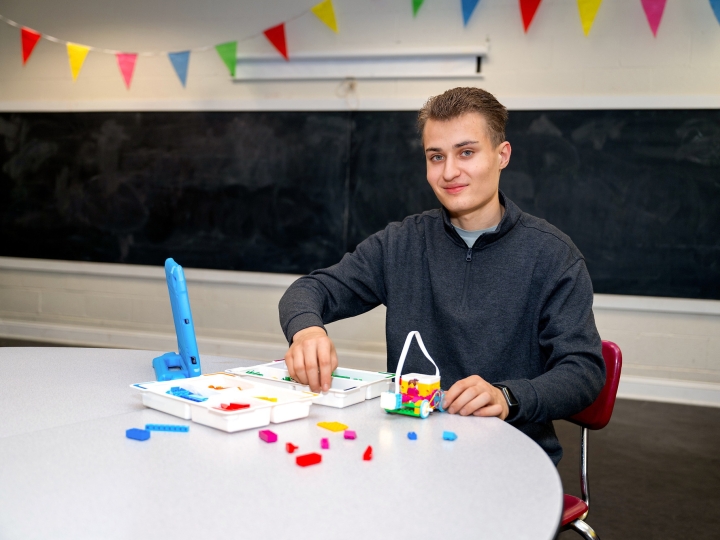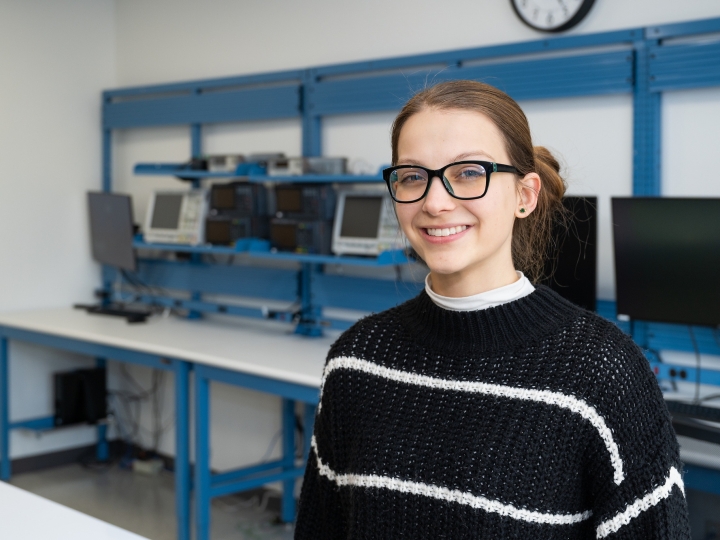
Caitlin D’Ambrosio ’21, Chemical Engineering
July 2, 2020
An internship at Tesla's Silicon Valley headquarters is the latest way Caitlin D'Ambrosio '21 is exploring her future. Photo by Lucy D’Ambrosio
"I've learned to give things my all, regardless of my fears, because you never know what the outcome is going to be."
When she first came to Bucknell, Caitlin D'Ambrosio '21 couldn't have pictured that just three years later she'd be in Silicon Valley on an engineering internship with Tesla, Elon Musk's automotive and energy company. Her aspirations then were light-years away.
"I was considering going into scientific research or medicine," she says. "I never really expected myself to go into engineering — I always thought it was about building bridges and metal, and I never really had any interest in that."
But D'Ambrosio, who entered as an undeclared arts & sciences major from Scarsdale, N.Y., is also the sort of person who likes to experience things firsthand. At Bucknell, she found an environment that enables and encourages exploration. Curious about what goes on in Bucknell's other colleges, D'Ambrosio enrolled in Engineering 100, a first-year course that offers an overview of all eight Bucknell engineering majors. The class didn't just show her that the field was broader than she expected; in subjects like chemical and biomedical engineering, she found connections with her desire to do meaningful work that helps others.
"I loved the challenge and the sense of accomplishment I felt after solving a really hard problem or working on a team on projects that had real potential to help people," says D'Ambrosio.
Her interest was piqued, so she started searching for opportunities to experience engineering firsthand through undergraduate research. After reading a story on Bucknell's website about the work of Pat Mather, dean of the College of Engineering, she sent Mather an email asking if they could talk about his research. Sitting in the corner suite in the Dana Engineering Building, it dawned on D'Ambrosio how far she'd already come.
"When I got to the office I was thrown off — I was thinking, 'He's the dean of the engineering school, and I'm not even an engineering student yet. He's not going to take me,' " she says. "But it was like the complete opposite. He was super open to it."
D'Ambrosio soon switched paths to a chemical engineering major and began a three-year apprenticeship in Mather's lab, where she studied shape-memory polymers using cutting-edge research equipment, like the electrospinning for the studying fibers at the nanoscale that Mather purchased in 2016 with a grant from the National Science Foundation. By her sophomore year, she had already produced enough meaningful findings to present her work at a national engineering conference alongside grad students and professional engineers. It was there that D'Ambrosio recognized how much her Bucknell experience already stood out from those of her peers at other schools.
"I was so shocked that more undergrads weren't involved in research — or if they were, they were seniors or juniors and were considered very young to even be touching research," she says. "At most universities if you are doing undergraduate research you're really just a lab assistant. At Bucknell, it's very hands-on. You are assigned your own independent project, and it's you running experiments and presenting your findings. Instead of just doing one little thing for one part of a project, you're controlling the whole thing."
Her experience wasn't only apparent to other students and professors, it also set D'Ambrosio apart when she turned to exploring future careers through internships, including a finance internship on Wall Street and her most recent experience with Tesla.
"Many of the interviewers were surprised that someone like me, being so young, would have experience with such high-tech equipment that most people don't touch until they're in grad school," she says.
D'Ambrosio would spend her Silicon Valley summer studying materials used in Tesla's batteries, challenging her to apply her skills to questions beyond the comfort zone she developed in her Bucknell lab. It was the latest in a string of experiences taking D'Ambrosio to places she didn't imagine a few short years ago — ones that have given her a clearer picture of what her future looks like. She's learned that she loves life in the lab, so after graduating, she's planning to pursue a career in engineering research and development, with an eye to eventually earn a Ph.D.
"I've grown so much over every year I've been here and become more confident in the work that I'm doing," she says. "There hasn't been one class or research experience I regret having — everyone has been so encouraging and supportive. Without my Bucknell experience, I wouldn't be the person I am today."

